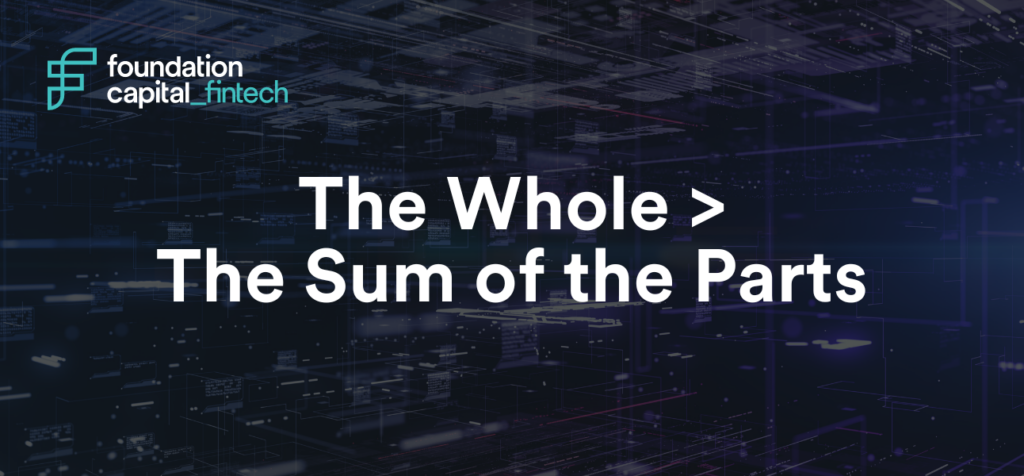Where is All the Differentiation in Fintech x AI?
02.12.2024 | By: Charles Moldow, Gracie Zaro
Finding meaning in the whole, rather than the sum of the parts.
With large sums of venture money pouring into anything “AI” (just check out YC’s winter 2024 batch), we have a growing number of copilots, agents, APIs and foundational models serving any given vertical. Name the point solution and you’ll likely find a swath of options promising to improve efficiency and insight. So, how do we know what AI-backed RIA, insurance broker or CSR is truly superior, different, venture-worthy? What truly distinguishes one AI-driven product from another? Likely, the answer lies in the data these companies collect, use and learn from.

In particular, AI technology becomes increasingly interesting in use cases where “the whole” of the data is greater than “the sum of its parts.” It’s a combination of quality and quantity: companies positioned to ingest large swaths of data are well-positioned to capitalize on the technology driving AI applications. They are equipped with the foundation to build out products (platforms!?) as opposed to features. Considering this, it might seem that giants like JP Morgan, Berkshire Hathaway, Microsoft, Meta, Apple, and Google will dominate the market, leaving little room for new competitors. VCs would be out of a job if this were true; so I must say there’s more to the story, especially in vertical-specific use cases.
While this is by no means an exhaustive list, the following are key focus areas that Foundation believes align well with our thesis of ‘the whole > the sum of the parts:’
- Claims Guidance: Every year, millions of claims are submitted to carriers across the country; the process of decisioning is manual and often ad-hoc. Software can increase throughput and provide significant savings by employing market-wide insights that result in more intelligent decisioning. EvolutionIQ, one of our insurtech investments, is particularly well-positioned to capitalize on this opportunity in the worker’s comp / liability vertical.
- SMB Finance: With over 33 million small businesses in the US, a massive amount of data remains largely untapped, often siloed in offline repositories or obscured within conventional systems. Emerging vendors have the opportunity to derive unique insights and ship new products as they build data moats across an increasingly digital (not to mention, massive) market. Our portfolio company Glean, for example, is well suited to build products powered by the spend-data collected as part of their core AP offering.
- Real Estate: Both commercial and residential real estate remain largely offline industries ripe for software innovation and data automation. Property managers, agents and buyers use point solutions and manual workflows, resulting in inefficiencies and missed opportunities. Inspectify is not only digitizing the inspection experience, but also transforming once-offline and unstructured information to create valuable datasets that are valuable to the wider ecosystem.
- Blockchain / HyFi: While blockchain technology promises a more secure, transparent mode to transact, there is no shortage of bad actors exploiting a still-nascent ecosystem. Thus, there is real opportunity for companies to better understand the underlying transaction data and apply this to more robust security practices. Using AI, Coincover employs proprietary data, live transaction data, market research, and knowledge of threat vectors, to assess a given user’s risk and actively protect against on-chain loss. We believe there is ample value in the data set of legitimate (and illegitimate) addresses Coincover will handle at-scale.
- Consumer & Corporate Underwriting: People and businesses have an arsenal of credit-based financial products and services. While underwriting methods are often a business’ “secret sauce”, there is benefit in understanding a customer’s performance across the multiple vendors they use. Products providing this access, and even helping to decide on it, are well positioned to effectively leverage their core data. We’re particularly excited about how our own portfolio company Spinwheel will capitalize on this opportunity in the future.
There remains ample opportunity to innovate with AI. It’s our current view that true differentiation is found at the cross section of unique data ownership and the growing arsenal of available AI technology. Still, building an enduring business takes time and not every use case deserves a standalone chatbot, let alone four or five. While it might be easy to launch a GPT-powered copilot in a matter of weeks, the path of least resistance is not where breakouts are born. We encourage founders to deeply understand their moat from the outset, despite the temptation to build before identifying a true opportunity. Generating valuable, proprietary data is not a waste of resources, especially if it enables the realization of platform value. Conversely, we as investors have to actually practice what we preach. We can’t define early success or “backability” by buzzy words, superficial growth metrics and, of course, fomo! Falling into this trap does a disservice to ourselves and our founders.
Foundation Capital continues to learn from the ecosystem and adapt to the resources at its disposal. We are excited to keep backing early-stage companies with a strong understanding of how their product can leverage “the whole.”
Of course, if you are building, ideating or just want to talk / critique / comment, please reach out at gzaro@foundationcap.com! We, along with the team at Foundation Capital, would love to be your first call.
Published on 02.12.2024




